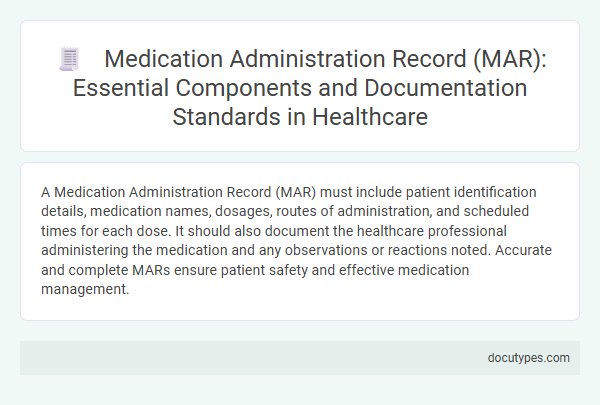A Medication Administration Record (MAR) must include patient identification details, medication names, dosages, routes of administration, and scheduled times for each dose. It should also document the healthcare professional administering the medication and any observations or reactions noted. Accurate and complete MARs ensure patient safety and effective medication management.
Introduction to Medication Administration Records (MAR)
Medication Administration Records (MAR) are essential tools used in healthcare settings to document the administration of medications to patients. They provide a detailed record that ensures accurate and timely delivery of prescribed treatments.
A MAR typically includes patient information, medication details, dosage, route, frequency, and the time of administration. It also records the initials or signatures of healthcare professionals administering the medication, ensuring accountability and patient safety.
Importance of Accurate MAR Documentation
Accurate documentation in a Medication Administration Record (MAR) is critical for patient safety and effective healthcare delivery. Your meticulous record-keeping ensures proper medication management and reduces the risk of errors.
- Patient Identification - Includes full name, date of birth, and medical record number to ensure that medications are administered to the correct individual.
- Medication Details - Lists drug name, dosage, route, frequency, and time of administration to guide precise treatment.
- Documentation of Administration - Records the date, time, and signature of the healthcare professional who administered the medication to verify accountability and track compliance.
Maintaining an accurate MAR supports safe medication practices and helps prevent adverse drug events in clinical settings.
Key Components of a Medication Administration Record
A Medication Administration Record (MAR) must include the patient's full name, date of birth, and medical record number to ensure accurate identification. It should list all prescribed medications with detailed information such as drug name, dosage, route of administration, and timing. Documentation of the nurse or healthcare professional administering the medication, including the date and time of administration, is essential for accountability and patient safety.
Patient Identification and Demographic Information
A Medication Administration Record (MAR) is crucial for ensuring the safe and accurate delivery of medications. Your MAR must include essential patient identification and demographic information to avoid errors.
- Full Name - Clearly states the patient's legal name to confirm identity during medication administration.
- Date of Birth - Provides a unique identifier that helps differentiate patients with similar names.
- Medical Record Number - Links to the patient's detailed medical history and current treatment plan for accuracy.
Medication Details: Name, Dose, Route, and Frequency
A Medication Administration Record (MAR) must include specific medication details to ensure safe and accurate administration. Key information consists of the medication name, dose, route, and frequency.
The medication name clearly identifies the drug being administered. The dose specifies the exact amount prescribed, while the route indicates how the medication should be given, such as orally or intravenously.
Documentation Standards and Regulatory Requirements
A Medication Administration Record (MAR) must include patient identification details, the medication name, dosage, route, and administration times to ensure accurate tracking. Documentation standards mandate clear, legible entries with date and time stamps, along with the signature or initials of the administering healthcare professional. Regulatory requirements from agencies like the Joint Commission and CMS enforce adherence to these standards to maintain patient safety and facilitate audits.
Electronic vs. Paper MAR: Benefits and Challenges
A Medication Administration Record (MAR) must include the patient's name, medication name, dosage, route, time of administration, and the administering healthcare professional's signature. Accurate documentation ensures proper medication management and patient safety.
Electronic MARs offer benefits such as real-time updates, automated alerts for potential drug interactions, and improved legibility compared to paper records. Paper MARs are simple, require no specialized technology, and provide quick access during system outages. Challenges for electronic MARs include initial setup costs and the need for staff training, while paper MARs risk errors from illegible handwriting and delayed updates.
Common Errors in MAR Documentation and Prevention
What items must be included in a Medication Administration Record (MAR) to ensure accurate documentation? A complete MAR should include patient identification, medication name, dosage, route, time of administration, and the administering nurse's initials. These details help prevent common documentation errors that can compromise patient safety.
How can common errors in MAR documentation be prevented effectively? Ensuring timely and accurate entry, double-checking medication details before administration, and using standardized notation reduce the risk of mistakes. You can improve patient outcomes by maintaining vigilance and following established protocols rigorously.
Role of Healthcare Professionals in MAR Management
A Medication Administration Record (MAR) must include specific items to ensure accurate tracking of medications administered to patients. Healthcare professionals play a critical role in managing the MAR to promote patient safety and compliance.
The MAR should contain patient identification, medication details, and administration times to maintain precise records.
- Patient Information - Includes full name, date of birth, and medical record number to avoid medication errors.
- Medication Details - Contains drug name, dosage, route, and frequency to ensure correct administration.
- Healthcare Professional Documentation - Your signature, time of administration, and any notes are essential for accountability and communication among care teams.
What Items Must Be Included in a Medication Administration Record (MAR)? Infographic

